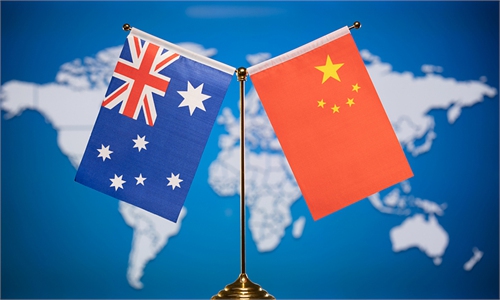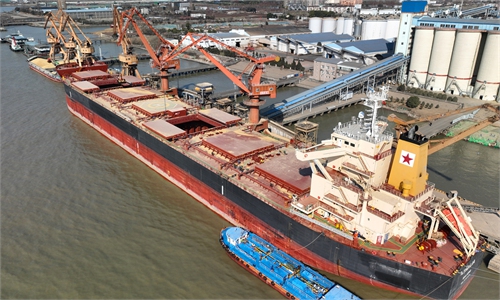
Illustration: Tang Tengfei/Global Times
In a sign of relations thawing between China and Australia, the Ministry of Commerce said Tuesday that the two countries have reached consensus on the resolution of the barley dispute under the framework of the WTO, demonstrating the spirit of mutually beneficial cooperation. Obviously, some anti-China forces in the US and Australia do not want to see China-Australia relations break the ice, but facts have proven that the two countries have the ability to properly handle trade frictions and divergences.In recent years, the US, in an attempt to deprive China of its right to development and maintain US economic hegemony, has politicized trade and economic issues, and coerced or courted some countries to suppress China's rise. Against the backdrop of fraying US-China relations and intense pressure from Washington to force other countries to pick a side and join the confrontation that fits only US interests, it is, frankly speaking, not easy for Canberra to seek an appropriate balance between the US - Australia's vital security ally - and China, which is its largest trading partner. However, in considering Australia's own interests, Australian politicians should maintain strategic sobriety and, at least, not turn Australia into cannon-fodder for an aggressive US Asian policy.
China-Australia consensus on resolving barley dispute is a positive signal to Australian business community, which has been eagerly awaiting warming trade relations, that China and Australia are able to resolve bilateral trade frictions through candid dialogue amid complex situations on the international stage. The positive development reflects a strong trade complementarity between the two countries and China's goodwill in resolving respective concerns on trade and economic issues in a balanced way. Hopefully the act of goodwill will receive a positive response from the Australian side. Years of frozen bilateral ties have dealt a blow to the Australian economy and businesses in the country are hopeful of better relations with China.
In May 2020, China imposed anti-dumping and anti-subsidy duties totaling 80.5 percent on Australia's barley for five years, which is in line with Chinese laws and WTO rules. China was the largest export market for Australian barley, reportedly accounting for more than half of its barley exports before 2020. Now, almost three years have passed, the consensus reached by the two sides on resolving barley dispute is great news for barley farmers and exporters in Australia, who are eager to return to the Chinese market.
A spokesperson for the Ministry of Commerce said on Tuesday that China is ready to work with Australia in the spirit of dialogue, consultation and cooperation to accommodate each other's industrial concerns and resolve their economic and trade disputes, including two cases still at the WTO panel stage, so as to promote the steady and long-term growth of bilateral economic and trade relations. China's sincerity can be seen from the spokesperson's remarks, but whether trade relations can continue to develop and ultimately get on track depends not only on China's efforts, Australia must be proactive and persistent while refraining from joining the US' anti-China geopolitical game.
In the past few years, China-Australia relations have encountered difficulties and setbacks. Chinese people generally believe bilateral relations deteriorated due to Washington's meddling and prodding. Now, as bilateral relations are showing improving signs, US politicians continuously instigate Australia to counter so-called China's "economic coercion," trying to exert pressure on the Chinese side and further complicate China-Australia relations, but those people are going to be deeply disappointed by the result, as facts have proven that China and Australia can handle and overcome the negative effects caused by fabricated claims of "economic coercion." Of course, the US doesn't want to see China-Australia relations return to a normal, mutually beneficial state. The more improved China-Australia relations are, the more hysterical US politicians will be to put pressure on Canberra. Australia should maintain its composure. China and Australia are each other's important trade and economic partners. To improve and ensure a sound economic relationship is in the fundamental interest of both peoples.?
It should be pointed out that Australia fired the "first shot" in undermining China-Australia economic relations. After China's anti-dumping and anti-subsidy investigation and relevant punitive tariffs against Australia's barley imports became sources of tension, China's Commerce Minister said in May 2020 that the investigation is the only one initiated by China on Australia, compared to more than 100 investigations launched by Australia. Australia was also the first country in the world to ban Huawei and other Chinese suppliers from providing 5G equipment. At the prospect of the warming up of the bilateral relations, Canberra needs to contribute by showing good faith, resisting pressure from Washington and provide fair treatment to Chinese companies.
The author is a reporter with the Global Times. bizopinion@globaltimes.com.cn



